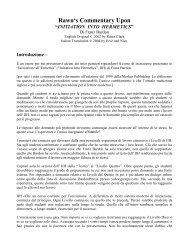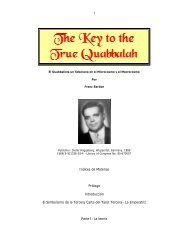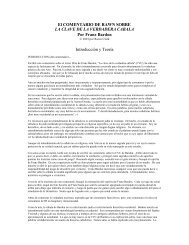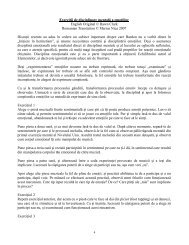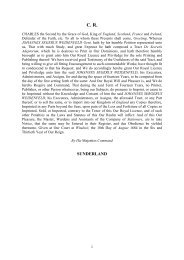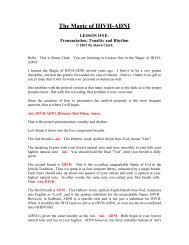Hermetic Philosophy and Alchemy - A Bardon Companion
Hermetic Philosophy and Alchemy - A Bardon Companion
Hermetic Philosophy and Alchemy - A Bardon Companion
Create successful ePaper yourself
Turn your PDF publications into a flip-book with our unique Google optimized e-Paper software.
Plunderers, with prying eyes, Away!<br />
What mean you by this curious stay?<br />
Hence with your cunning patron god,<br />
With bonnet winged <strong>and</strong> magic rod!<br />
Sacred alone to Pluto's name<br />
This mighty art of endless fame! (27)<br />
Hermolaus Barbarus, in his corollary to Dioscorus, or some other, where he is treating of the element<br />
of water in general, alludes to a particular kind that is distinct from every other water or liquor, saying,<br />
---There is a celestial, or rather a divine water of the chemists, with which both Democritus <strong>and</strong><br />
Trismegistus were acquainted, calling it divine water, Scythian latex, &c., which is a spirit of the<br />
nature of the ether <strong>and</strong> quintessence of things; whence potable gold, <strong>and</strong> the stone of philosophers,<br />
takes its beginning: The ancient author of the Apocalypse of the Secret Spirit of Nature is also cited by<br />
H. Khunrath, concerning this water; <strong>and</strong> he devoutly affirms, that the ether in this praeter-perfect<br />
aqueous body will burn perpetually, without diminution or consumption of itself, if the external air<br />
only be restrained (28). There are also, besides those mentioned by Pancirollus, modern accounts of<br />
lamps found burning in monuments <strong>and</strong> antique caves of Greece <strong>and</strong> Germany. But the Bononian<br />
Enigma, long famous, without a solution, should not be omitted here, since this relic has puzzled many<br />
learned antiquaries; <strong>and</strong> the adepts claim it as having exclusive reference to the occult material of their<br />
art.<br />
AELIA LAELIA CRISPIS<br />
Nec vir, nec mulier, nec <strong>and</strong>rogyna,<br />
Nec puella, nec juvenis, nec anus,<br />
Nec casta, nec meretrix, nec pudica,<br />
Sed omnia!<br />
Sublata neque fame, neque ferro, neque<br />
Veneno, sed omnibus!<br />
Nec coola, nec terris, nec aquis,<br />
Sed ubique jacet!<br />
LUCIUS AGATHO PRISCUS<br />
Nec maritus, nec amator, nec necessarius,<br />
Neque moerens, neque gaudens, neque flens,<br />
Hanc<br />
Neque molem, neque pyramidem. neque sepulcrum.<br />
Sed omnia,<br />
Scit et nescit cui posuerit,<br />
Hoc est sepulcrum certe. cadaver<br />
Non habens, sed cadaver idem,<br />
Est et sepulcrum! (29)<br />
The following excellent translations appeared amongst some original contributions in the early number<br />
of a literary periodical, a few years since (30):<br />
AELIA LAELlA CRISPIS<br />
Nor male, nor female, nor hermaphrodite,<br />
Nor virgin, woman, young or old,<br />
Nor chaste, nor harlot, modest hight,<br />
But all of them you’re told ---<br />
Not killed by poison, famine, sword,




![Magie de YHVH-ADNY et Archeus[1]](https://img.yumpu.com/16926522/1/190x245/magie-de-yhvh-adny-et-archeus1.jpg?quality=85)
